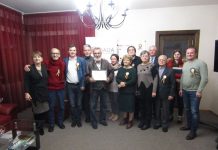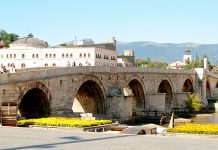 Paul Wood lucreaza in Romania din 1998 si conduce o firma de recrutare de personal – Apple Search – care se specializeaza pe recrutarea de middle si senior management pentru companii locale si multinationale. Inainte de a veni in Romania, Dl. Wood a lucrat ca broker pentru asigurari de risc politic in Londra. Dl. Wood este de formatie avocat, terminand dreptul la College of Law, in Londra. Prin Apple Search, Dl. Wood a plasat romani din New York pe piata de munca din Romania.
Paul Wood lucreaza in Romania din 1998 si conduce o firma de recrutare de personal – Apple Search – care se specializeaza pe recrutarea de middle si senior management pentru companii locale si multinationale. Inainte de a veni in Romania, Dl. Wood a lucrat ca broker pentru asigurari de risc politic in Londra. Dl. Wood este de formatie avocat, terminand dreptul la College of Law, in Londra. Prin Apple Search, Dl. Wood a plasat romani din New York pe piata de munca din Romania.
Acest interviu a fost realizat de Cezar Giosan, in exclusivitate pentru Conectii.ro, site-ul diasporei romanesti de la New York.
C.G. Mr. Wood, you came to Romania in a period when this country was doing very poorly economically – at the end of the ’90’s. What brought you to Romania? What was the main reason?
P.W. I first visited Romania in September 1990 and was enchanted by the country. I thought Bucharest was the most fascinating city I had ever visited. Bucharest is still the most fascinating and enchanting city I ever visited or I strongly suspect shall ever visit, with the possible exception of Havana. When I received an offer to work here I leapt at it and told my family I would spend the rest of my life in Romania. I have never reconsidered this decision, although Romania is no longer the exotic place it was in 1990. So my motives were not related to business at all. In fact I had not worked in recruitment at all but discovered within days that recruitment is my vocation and endlessly absorbing and enjoyable. And they say people like me who love their work never work a day in their lives.
C.G. You have worked for more than a decade in recruiting in Romania. What was the hardest period in your career as a headhunter in Bucharest?
P.W. When I started Apple with two colleagues in 2000 I suppose I was challenged. It was a bleak time. In one summer month I remember the total FDI was $1.9 million.
C.G. During the economic boom in Romania, the main problem in recruiting was finding suitable candidates for the numerous openings available. What strategies did you use back then to find the right people for the jobs you were trying to fill?
P.W. The problem from my clients’ point of view was the high salaries commanded by Romanian candidates who in 2006 were being paid salaries comparable with those in developed countries whereas they did not usually have the skills of their counterparts in developed countries. Persuasion is of course the art of the recruiter and one I very much enjoy. My childhood ambitions were advocacy and politics.
C.G. The economic explosion of 2000 led to an increase in the demand for specific competencies and job skills, which few people possessed at the time. The result was a dramatic increase in compensation for middle and top management positions, which, in a few years became comparable with that in developed countries. Also during that time, more Romanians abroad began to think of a return. Can you give me a few examples of Romanians abroad placed in Romania by your firm during that time? What was the main reason that made those people come back to the country?
P.W. I know very many such cases and am surprised at how surprised Romanians are when they return after many years and find things have greatly changed. Yet I myself expect the London I left to be the same as the one I visit now. The age at which people become old fogeys according to William James is about 26 and after that age people find change hard to keep up with or to adapt to. But the truth is that a clever Romanian with ambition is far more use in his own country than in a foreign one and the opportunities in a developing country are far greater usually than in developed ones both in terms of money and in terms of responsibility. I agree with Alina Mungiu Pippidi that the huge wave of emigration from Romania is a good thing on balance. Even the crop pickers learn through the air in Spain or Italy a different way of doing things – lessons that will teach them how to work better and how to cast their vote in Romania. The minority who return are the hope of Romania. Although a few who return seem– like the Bourbons – to have learnt nothing and forgotten nothing, most have learnt a great deal, though some have not forgotten enough.
The revolutions of 1848 succeeded in the sense that so many of the best of the generation of 1848 fulfilled their ideals or republicanism and freedom, but in the USA. I want the students in Piata Universitatii to overcome the Bolshevik forces they fought against by going to the West for some years and returning to make a difference. Even if the majority do not come back enough will come back.
C.G. The economic depression is being felt profoundly in Romania. Has your business been affected?
P.W. Well, more affected than any other but, in fact, although I was despondent in 2009 we managed to make a profit even in that year and we did well last year and this. But I am of course like everyone scared that the world may be about to enter the second dip of a double dip recession or that we might be in for a decade of recession which feels well deserved after the financial debauchery of the last fifteen years in the developed world.
But my firm will survive and so will Romania. I remember R.G. Waldeck’s remark in her book ‘Athene Palace’: “The Romanians possess to the highest degree the capacity of receiving the blows of fate while relaxed. They fall artfully, soft and loose in every joint and muscle as only those trained in falling can be. The secret of the art of falling is, of course, not to be afraid of falling and the Romanians are not afraid, as Western people are. Long experience has taught them that each fall may result in unforeseen opportunities and that somehow they always get on their feet again.”
A very good observation.
C.G. As a headhunter, you usually negotiate the candidate’s salary, as well. What’s the range, in general?
P.W. In general I bring back Romanians from the USA for salaries comparable or larger than the ones in the USA and, in any case, the cost of living is lower than in the States and promotion prospects often much brighter.
C.G. Let’s talk about New York, world’s financial center. Many Romanians work here, on Wall Street, and would be perfect for some of your openings. What strategies do you use to “lure them”, besides posting on various forums?
P.W. I send out mails to candidates in the USA and make much use of the New York-based RBPA e-group which has yielded me very many good candidates whom I placed, but I should be delighted to know more methods of finding good people. I have brought many Romanians back from the States to work in corporate finance and the Big Four.
C.G. Do you have success stories – Romanians from New York whom you placed in Romania – that you could share?
P.W. Yes, very many before the crisis. Here are two of them, for example.
C.G. How do you collaborate with the Romanian Business Professionals Association (RBPA), the online community in New York that has the greatest recruiting potential for you?
P.W. All C.V.’s from RPBA are read by me personally and I am very grateful to the group for the very many good C.V.’s I received and the very many people I have met personally through this group.
C.G. What positions are you trying to fill now?
P.W. There are of course fewer opportunities this year in Romania, which no longer offers a refuge for Romanians from Wall Street who had been downsized as it did in the period 2007-2008. However I can speak with most authority about my two specialties: legal recruitment and recruitment for the Big Four and the financial sector. Here I am seeing movement and I should very much like to speak to Romanian lawyers auditors and tax consultants who want to return. I am also looking for people recently graduated or up to two or three years out of (prestigious) universities who want to go into management consulting. I would also like to find a good mall manager with North American experience. The full list is available on our website.
C.G. Mr. Wood, thank you so much for your time and I wish that you bring back home as many of us as possible!











































